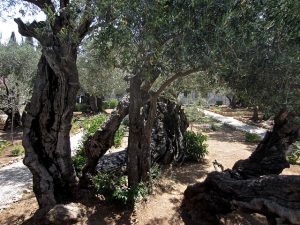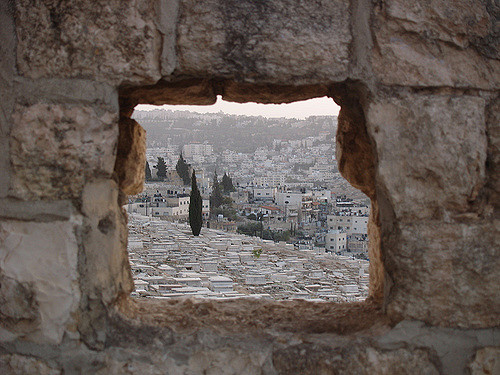Narrative Lectionary Reflection for Palm Sunday, Year Three
Lessons: Luke 19:29-44, Psalm 118:19-23 (or 118:20)
Theme: God’s faithful and generous people enter Holy Week with open hearts, minds, and time to fully participate in the life of the congregation. We acknowledge in our choices and decisions that everything is an act of stewardship—of time, of talent, of resources, of self—of every aspect of life.
Key Scripture: He [Jesus] answered, “I tell you, if these were silent, the stones would shout out.” As he came near and saw the city, he wept over it, saying, “If you, even you, had only recognized on this day the things that make for peace! But now they are hidden from your eyes. Luke 19:40-42
Preaching/Teaching Reflection
The lesson appointed for this Sunday contains very little of the usual pomp and circumstance we associate with Palm Sunday. Sure, there are cloaks laid down and praises offered up, but there’s nary a palm frond to be found. And Jesus weeps over the city. Would Jesus weep today if he rode into our cities and congregations?  After all, his path was clear then, and not much has changed today.
After all, his path was clear then, and not much has changed today.
Perhaps the better question is would we see Jesus? Would we recognize him as the Son of God and Savior of the world? If past behavior is any predictor, we learn from this lesson that we most likely would not. Even the joyous rag tag band of disciples and misfits that throw down their cloaks in Jesus’ path leave him when push comes to shove and the powers of Empire and the religious elite come to take him away and kill him for upending order and disrupting the status quo.
Will we hear the cries of those whose voices are so often silenced? In the past few days we have watched as a natural disaster claimed hundreds of lives in Columbia and as manmade chemical warfare brutally killed innocent civilians, including many children in Syria. Do we hear the voices of our sisters and brothers who lack the power and resources to extricate themselves from places of danger, from poverty, and from the hell of war? What of the genocide and famine in South Sudan?
What of those who are silenced in our local communities? Addicts, prisoners, those living in poverty, transgender sisters and brothers, our Black neighbors, the refugees, and the undocumented workers who live lives of fear are among those whose voices long to shout from the stones that confine and crush them. Do we see them? Can we hear them? Jesus does—of that we can be certain.
Listen to Jesus saying to the powerful, the righteous and those in positions of authority: “If you, even you, had only recognized on this day the things that make for peace! But now they are hidden from your eyes.” To whom does he speak these words today? What are the things that make for peace?
What if, dear friends, what if we truly enter into Holy Week and the story of Jesus’ walk to the cross? What if we took this week to look, to listen, and to accompany those who have been silenced? What if we take seriously Jesus’ words and weariness with our sinful disobedience?
We have a unique opportunity to experience this week in word, in Sacrament, in deed, and in solidarity with our sisters and brothers, with every molecule and atom of this beautiful broken world. Holy week is so much more than just a parade of palms and a hymn or two. It is a call to enter the way of Christ, to walk behind the  scenes of celebration and encounter the trash of our poor choices and the smelly, messiness of human life. We must walk with our Lord into some mighty dark, possibly distant, and certainly uncomfortable places. Of course, we know the rest of the story, and we know that there’s Easter just over the horizon with its resurrection hope and promise of new life. But first, first we must journey through the valley of the shadow of death and climb the hill to the cross. First we must weep and mourn and then begin to repair the breach by giving voice to the voiceless and hope to the hopeless.
scenes of celebration and encounter the trash of our poor choices and the smelly, messiness of human life. We must walk with our Lord into some mighty dark, possibly distant, and certainly uncomfortable places. Of course, we know the rest of the story, and we know that there’s Easter just over the horizon with its resurrection hope and promise of new life. But first, first we must journey through the valley of the shadow of death and climb the hill to the cross. First we must weep and mourn and then begin to repair the breach by giving voice to the voiceless and hope to the hopeless.
May this week bring you new revelations, deeper faith, and a holy discomfort on your way to the empty tomb. Blessings on your journey.
In Worship
If you have teenagers or adults who enjoy acting and who are willing to help you create more visual impact with your palm procession, have them dress up as part of the crowd that welcomes Jesus into Jerusalem. Rehearse with them beforehand so they will know exactly what you want them to do. Is it possible to get a real donkey for your parade? Consider having them run to the place where you gather for the processional, crying “Jesus is coming!” “Jesus of Nazareth is coming.” “Blessed is the king who comes in the name of the Lord! Peace in heaven, and glory in the highest heaven!” Invite them to spread cloaks down the aisle and lead the procession.
With Youth
Who does the world not see today? Which people would the powerful and mighty folk of this age wish would disappear? If Jesus paraded into your town today on a donkey, what sort of people would be lining the streets? Perhaps it would be the widows, orphans, refugees, children and poor people. Who wouldn’t be there? It’s likely that the powerful and those in charge of governments and corporations wouldn’t have time to check out this renegade rabbi. What about good church people? Would we drop everything from our busy schedules and show up?
Discuss these and similar questions with your youth. Then, ask them where they do see Jesus showing up today? What does Jesus look like? Consider using St. Teresa of Avila’s poem printed below.
With Children
The Lord Needs YOU!
Jesus tells his disciples to go and secure a certain donkey for him to ride into Jerusalem. He tells his disciples that if anyone asks why they are taking it to simply say, “The Lord needs it.” What about these words? On that day the Lord needed a donkey. Jesus doesn’t need a donkey today. What does the Lord need from us today? (Allow time for the children to think and respond. Affirm their ideas.) What about…our hands…our feet…our time…our talents…and our resources? Born in Spain in 1515, St. Teresa of Avila wrote this poem:
Christ has no body but yours,
No hands, no feet on earth but yours,
Yours are the eyes with which he looks
Compassion on this world,
Yours are the feet with which he walks to do good,
Yours are the hands, with which he blesses all the world.
Yours are the hands, yours are the feet,
Yours are the eyes, you are his body.
Christ has no body now but yours,
No hands, no feet on earth but yours,
Yours are the eyes with which he looks
compassion on this world.
Christ has no body now on earth but yours.
Maybe this is what the Lord needs today, and every day of our lives. Invite the children to trace their hands and feet on a long piece of butcher or brown packaging paper. Have them write their names. Print the poem somewhere on the page and in large letters write: “Jesus Needs YOU to be His Hands and Feet in the World!”
Weekly Stewardship Bulletin Insert
Jesus’ triumphant entry into Jerusalem included all those people that the authorities cannot silence—the ones who had witnessed miracles and those on the margins. So what in the world does Palm Sunday have to do with stewardship, especially today? As God’s faithful people we can answer with certainty: A lot! First of all, how we steward this story of faith and how we allow it to shape our entry into fully participating in Holy Week is an act of stewardship. Arranging our busy schedules to make time this week to fully immerse ourselves into the worship life of our congregations is an act of stewardship. We are also called to be good stewards of resources when we choose eco-friendly palms, for example, or when we opt for non-styrofoam cups for coffee hours and Easter breakfast. Caring for those whom the world does not see, especially those who are in prison or living in poverty, and advocating for justice are acts of stewardship. In short, every decision or choice we make has stewardship implications. Ponder this notion during the days of Holy Week as you contemplate how our Lord Jesus Christ fully invested himself in the redemption of this entire creation.
Stewardship at Home
The week leading up to Easter—Holy Week—may also be a time of preparation that provides opportunity to contemplate stewardship. Do you fill Easter baskets? If so, might you aim for a zero or low waste basket? Click here for more information. Will you be purchasing chocolate to fill those baskets? Is your chocolate from fairly-traded sources or might it possibly be contributing to the global human trafficking problem. Click here for more information. Might you forego the Easter basket tradition altogether this year and give the money to a local ministry that helps the homeless, those in prison, or refuges resettlement?
Finally, instead of purchasing plastic eggs to fill, how about using natural dyes to decorate real eggs? And what about the cost of that Easter dinner feast? Could you consider donating an amount equal to what you are spending to a world or local hunger ministry? Above all, spend time in prayer this week asking God to help you hear those who are easy to ignore and to see those on the margins.
Photos: Susie Cagle, brion v, and Glen Edelson, Creative Commons. Thanks!
Note: Reprint rights granted to congregations and other church organizations for local, nonprofit use. Just include this note: “Copyright (c) 2017, Rev. Sharron Blezard. Used by Permission.” Other uses, please inquire: thewritelife@hotmail.com.




Leave a Reply